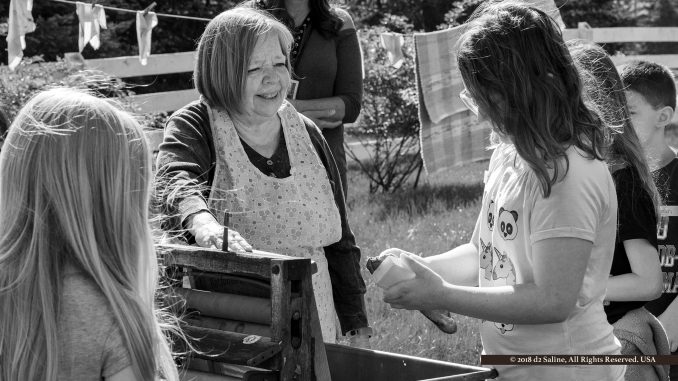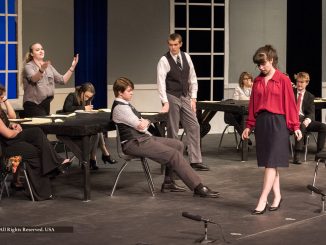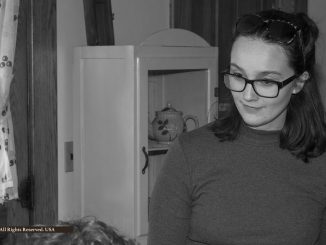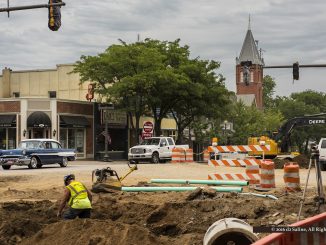
After reaching a certain age, many adults feel they “should” have all the answers. The last thing anyone wants to do is “ask a silly question.” Don’t engage, don’t get too close — and look, don’t touch.
That’s unfortunate. Those people are missing out. And needlessly so.
Unlike typical museums of national and even some regional repute, our own Rentschler Farm Museum isn’t behind glass. Key artifacts are functional, very much accessible. Numerous areas of the property are actively worked as a farm, inside and out — following to the standards and technology as it existed in the 1930s. Depending on the season, this can range from having livestock in the barns to food preparation in the kitchen. [1,2,3]
Earlier this month, volunteers from Saline Area Historical Society further raised the bar by presenting its “Living History Program” at the farm. Running about ninety minutes total, it was developed for elementary school children who came out in field trip groups. Once there, children were divided into three groups to rotate through stations in 25-minute segments.
Rather than lecture or more clinicly present their topics, docents dressed in period appropriate attire adopted the personas of historical characters, interacting with their audiences.
On one of the days that Saline Journal was on site to cover this story, “Aunt Elowene” was managing the “chore yard.” Enacted by Cheryl Valentine, Aunt Elowene was the real-life sister of patriarch Emanuel Rentschler. Among the several things demonstrated during her rotations, she worked with eager students to run clothing items through a washing machine then hanging them on the line to dry; she also helped them actually plant real potatoes in the kitchen garden to grow this season.
To more fully appreciate this offering, it may be helpful to remember that Rentschler Farm Museum was not rigidly conceived as a “museum” in the sense that it wasn’t built to house artifacts. Rather, it might be better to think of it as the preservation of a functional environment frozen in time. Neither is Rentschler Farm a “children’s museum,” although this might be among the better labels one could use for understanding its impact. [4,5,6]
… Carol Enseki (1997), at the time Director of the Brooklyn Children’s Museum, writes about five things children’s museums achieve: Inspiring independent interest in learning, offering children an active role which leads to ownership of and comfort in the museum, redefining ‘expertise’ to allow independent exploration, a commitment to diversity, and cultivating curiosity that leads to connectedness with the larger community. Throughout the literature we see an emphasis on developing curiosity and an interest in independent learning, and a commitment to cultivating broad-mindedness and engagement in the larger world.
Although the Living History Program is a limited offering for grade school field trips, many elements of its content are readily apparent on the Rentschler Farm Museum grounds. Visit during weekend hours between May and December, and volunteers from the Saline Area Historical Society will gladly provide additional details on specific areas of interest — though probably not put you to work while doing so. Look for QR Codes on the site for free video discussions of key spots here as well. [7]
People who’ve visited multiple times often say they notice something different every time. For your next trip, consider adjusting the way you approach the act of noticing; imagine what the experience was like for twenty-first century children who’d come here for a field trip. Come with an open mind. Ask questions. [8,9,10]
Touch history.
References
- Rentschler Farm Museum (home page).
- “How Well Do You Know the Community Impact of Your Saline Area Historical Society?” Dell Deaton (April 19, 2018) Saline Journal.
- “Celebrate ‘Pretend to be a Time Traveler Day’ Here in Saline” Janet Deaton (December 8, 2017) Saline Journal.
- “About Children’s Museums” Association of Children’s Museums.
- “Why We Need Children’s Museums” Richard Rende PhD (February 19, 2016) Psychology Today.
- “Where are the objects? Why is this a museum? What allows us to claim special educational status for these charming play spaces?: Turning to Curator for answers” Rebecca Shulman Herz (May 2, 2017) Curator Journal.
- “Virtual Docents Now On Duty 24/7 at Rentschler Farm Museum” Dell Deaton (November 25, 2017) Saline Journal.
- “Are museums still relevant?” (July 12, 2017) CNN.
- “Image Seeing Rentschler Farm Museum through the Eyes of a Child During Your Next Visit, Part 2” Dell Deaton (June 8, 2018) Saline Journal.
- “Imagine Seeing Rentschler Farm Museum through the Eyes of a Child During Your Next Visit, Part 3” Dell Deaton (July 20, 2018) Saline Journal.



